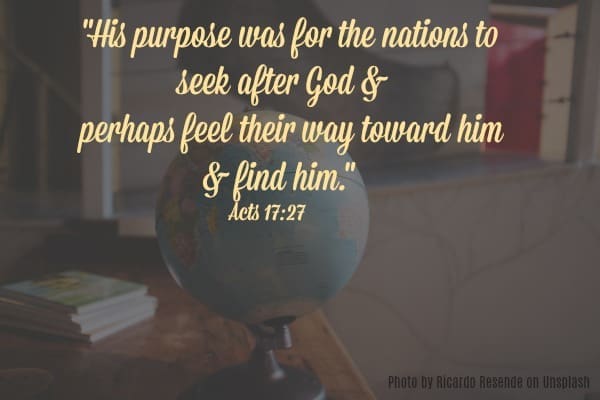We entered our fifth week in the study, Power for the World, where we read of Paul, Silas, and Timothy and the different people with whom they interacted. They gave us lasting examples of effective communication:
- Encouragement is often needed “once more”. Paul and Silas are in prison but the city officials are alarmed because it is they who have committed the crime. Paul did not want to just be released, he wanted his name cleared for the sake of the Gospel. Paul returns to the home of Lydia to encourage the believers once more. His concern was for these new Christians to be strong in their faith so that with future challenges they would not waver. Often the struggles we face are not solely about us. The insight we gain may help someone when they face similar challenges. Have you found this to be true in your life? Acts 16: 40 tells us, “There they met with the believers and encouraged them once more.“ There are times when encouragement is needed “once more”. May we be people who will admit when we need to be encouraged again. More so, may we be those who encourage others “once more.”

- Our labor of prayer and love won’t be in vain. In Acts 17:1-9 we find Paul in Thessalonica in the synagogue of the Jews, where he spent much time reasoning, explaining, and demonstrating that Christ had to suffer and rise again from the dead. Throughout his time of presenting Christ, a great multitude of devout Greeks, and a few of the women, joined Paul and Silas. Paul was able to minister to the group, not giving up or growing weary, but continually demonstrating the love of Christ.
- We must search the Scriptures to verify truth. As we read Acts 17:10-15, we encounter the Bereans. In verse 11, they are described as being “more open-minded and listened.” They searched the Scriptures to verify the truth of Paul’s message. We need faith and intellect. In a time when we can readily access Christian messages on TV and online, we must be careful with what we hear and take in. In our study, Kathy Howard writes: “It is our responsibility to test what we hear, to confirm all teaching against God’s Word, and to be good stewards of God’s priceless gift.”Â

- We must evangelize in love. While waiting for Silas and Timothy to arrive in Athens (see Acts 17: 16-21), Paul grew distressed at seeing the city full of idols. Even though full of emotion, Paul restrained himself and continued to teach in the synagogue and marketplace daily. In so doing, he was given an opportunity to share with those who worshiped idols. Instead of criticizing the men of Athens, Paul demonstrated the very way people will be drawn by the love of Christ in us and want to know more.
- We must build bridges to connect with others. In Acts 17: 22-28, Paul spoke to the council in Athens. They were philosophers, thinkers, men who basically leaned on their intellect.. Paul knew how to approach and relate to those he was talking. He did not share prophecies or the history of God’s people for they may not have known any of this. He approached them based on that which they did know – “the unknown God” – and shared about the one true God, Whose nature Paul knew well. He did not water down or change his message. He simply found the way to hold their attention based on what they knew, gaining an entry point into their hearts.
 The early believers knew to whom they were speaking
The early believers knew to whom they were speaking
and communicated in such a way as to connect.
And so must we.
Photo by Ricardo Resende on Unsplash
Today I am joining … Inspire Me Monday .





May God help us be responsible with this duty of sharing the Gospel of Jesus Christ. May we continually carry out this duty with love and wisdom. Thanks for sharing, Joanne. Blessings to you.
Boma, yes! May He fill us with His love and wisdom as we share. Blessings!
Dear Joanne, as an educator in an urban area, I quickly learned the importance of building schema with students in order to promote comprehension. Never realized our friend, Paul, was doing the same with the early church. Thanks and blessings for sharing these insights.
We are constantly learning aren’t we, Alice. I’ve read Acts so many times over my life and yet these insights fell fresh.